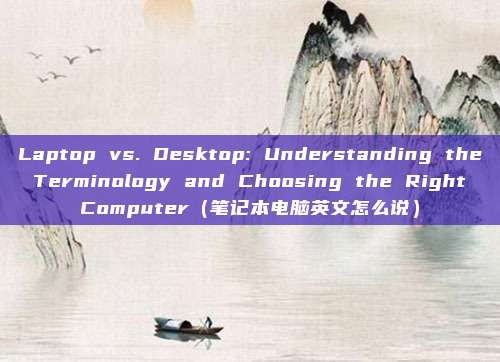Laptop vs. Desktop: Understanding the Terminology and Choosing the Right Computer(笔记本电脑英文怎么说)
温馨提示:这篇文章已超过235天没有更新,请注意相关的内容是否还可用!
In the ever-evolving world of technology, understanding the terminology surrounding computers is crucial for anyone looking to make an informed purchase. Whether you're a student, a professional, or a casual user, knowing the difference between a laptop and a desktop, and their respective terms in English, can help you select the perfect device for your needs. In this article, we'll delve into the English words for "computer," "laptop," "desktop," and other related terms, providing you with the knowledge to make a well-informed decision.
The English Word for "Computer"
First and foremost, it's important to clarify that "computer" is the broad term used to describe any device capable of processing data. However, when referring to the portable and stationary versions of these devices, we use specific English words:
Laptop: This term is commonly used to describe a portable computer. Laptops are designed to be easily carried around and are often preferred for their convenience.

Desktop: A desktop computer, on the other hand, is a stationary machine that is typically used in a fixed location, such as an office or home.
Additional Terms
Understanding some additional terms can further clarify the differences between laptops and desktops:
Notebook: Although often used interchangeably with "laptop," "notebook" specifically refers to a smaller, more compact laptop that is lightweight and portable.
Tower: A desktop computer that comes in a tower-shaped case is often referred to as a "tower desktop." These are larger and offer more space for upgrades and cooling.
All-in-One: This term describes a desktop computer that combines the display, processor, and other components into a single unit, similar to a laptop.
Choosing the Right Computer
When deciding between a laptop and a desktop, several factors should be considered:
1、Portability: If you need a computer that you can take with you, a laptop is the way to go. Desktops, while less convenient for mobility, offer more power and better cooling.
2、Performance: Desktops typically offer higher performance, especially for tasks that require a lot of processing power, such as gaming or video editing.
3、Cost: Laptops are generally more expensive per unit of performance due to their portability and compact design. Desktops can be more cost-effective for users who don't require constant mobility.
4、Upgradability: Desktops are easier to upgrade than laptops, allowing users to replace or add components as needed to keep up with technology advancements.
Conclusion
Understanding the English terminology for computers, including "laptop" and "desktop," is essential for anyone looking to purchase a new device. By considering factors like portability, performance, cost, and upgradability, you can make an informed decision that aligns with your needs and preferences. Whether you opt for a portable laptop or a powerful desktop, being aware of the right computer terms will ensure you're well-equipped to navigate the tech market.
According to a report by Gartner, global PC sales are expected to grow by 4.4% in 2023, driven by a strong demand for laptops. This underscores the importance of knowing your options and choosing the right computer for your needs. With the right terminology at your disposal, you'll be well on your way to making a satisfying purchase.
网站文章、图片来源于网络,以不营利的目的分享经验知识,版权归原作者所有。如有侵权请联系删除!





还没有评论,来说两句吧...